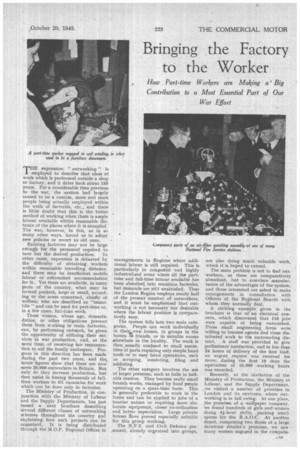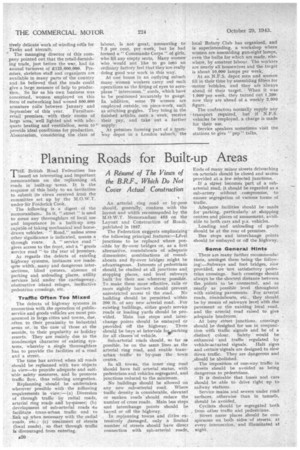Bringing the Factory to the Worker
Page 21

Page 22

If you've noticed an error in this article please click here to report it so we can fix it.
How Part-time Workers are Making a' Big •
Contribution to a Most Essential Part of Our War Effort THE expression " outworking " is employed to describe that class of work which is performed outside a shop or factory, and it dates back about 150 years. For a considerable time previous to the war, the system had largely ceased to be a custom, more and more people being actually employed within the walls of factories, etc., and there is little doubt that this is the better method of working when there is ample labour available within reasonable distance of the places where it is occupied. The war, however, in this, as in so many other ways, forced us to adopt new policies or revert to old ones.
Existing factories may not be large errough for the personnel required to
turn out the desired production. In other cases, expansion is debarred by the difficulty of obtaining workers within reasonable travelling, distance, and there may be insufficient mobile labour or ccffivenient accommodation for it. Yet there are available, in many parts of the country, what may be termed pockets, large or small, according, to the areas concerned, chiefly of \yob-ten, who are .described as "immobile" and can be used for part-time or, in a few cases, full-time work.
These women, whose age, domestic duties, or other obligations prevent them from working in main factories, can, by performing outwork, be given the opportunity of utilizing their services in war production, and, at the same time, of receiving fair remuneration to aid the family exchequer. Progress in this direction has been made during the past two years, and the, latest figures show that there are now some 20,000 outworkers in Britain. Not only do they increase production, but they assist in freeing thousands of fulltime workers to fill vacancies for work which can be done only in factories.
The Ministry of Production, in conjunction with the Ministry of Labour and the Supply Departments, has just issued a neat brochure describing several different classes of outworking schemes throughout the country and explaining how such projects can be organized. It is being distributed through the M.O.P. Regional Offices to managements in Regions where additional labour is still required. This is particularly in congested and highly • industralized areas where all the parttime and full-time labour available has been absorbed into munition factories, but demands are still unsatisfied. Thus the London Region employs nearly half of the present number, of outworkers, and it must be emphasized that outworking is not necessary nor desirable where the labour position is comparatively easy.
The system falls into two main categories. People can work individually in theiroown homes, in groups in the homes of friends, or in suitable rooms *lsewhere in the locality. The work is then _usually confined to small assemblies of parts requiring only simple hand tools or to easy hand operations, such as scraping, insulating, filing and soldering.
The other category involves the use of larger premises, such as balls in 'suitable centres. They become really small branch works, managed by local people operating cin a spare-time basis. This is generally preferable to work in the home and can be applied to jobs of a heavier nature or requiring more elaborate equipment, closer co-ordination and better supervision. Large private houses gave proved especially suitable for this group working.
The N.F.S.. and Civil Defence per.sonnel, already organized into groups, are also doing much valuable work, which it is hoped to extend.
The main problem is not to find outworkers„ as these are comparatively abundant, but to convince manufacturers of the advantages of the system, and those interested are asked to make arrangements in consultation with Officers of the Regional Boards with whom they normally deal.
A striking example given in the brochure is that of an electrical concern, which discovered that 116 jobs were capable of being outworked. Three small engineering firms were willing to become agents And these distributed work to the surrounding district. A staff was provided to give preliminary instruction, and in less than 24 hours of delivery of the first load, an urgent request was received for more; during the first 10 days the equivalent of 18,000 working hours was recorded.
Recently, at the invitation of the Ministry of Production, the Ministry of Labour, and the Supply Department, ,we visited a number of premises in London and its environs, where outworking is in full swing. At one place, the premises of a wallpaper company, we found hundreds of girls and women doing 41-hour shifts, packing small spares for the R.A.O.C. At another depot, comprising two floors of a large furniture retailer's premises, we saw many women engaged in the compara tively delicate work of winding coils for Tanks and aircraft.
The managing director of this company pointed out that the retail-furnishing trade, just before the war, had -an annual turnover. of £125,000,000. Premises, skeleton staff and organizers are available in many parts of the country and he believed that the trade could give a large measure of help to production. So far as his own business was concerned, women employed on this form of outworking had wound 500,000 armature coils between January and September of this year. Furnitureretail premises, with their rooms of large area, well lighted and with adequate heating and ventilation, seem to• provide ideal conditions for production. Absenteeism, considering the class of
labour, is not great, amounting to 7.3 per cent, per week, but he had formed a "Commando Corps ". of girls, who fill any empty seats, Many women who would not like to go halo an ordinary factory feel that they are really doing good war work in this way.
At one house in an ontlying suburb Many women workers carry out such operations as the fitting of eyes to aeroplane " intercomm." cords, which have to be positioned 'accurately to gauge. In_ addition, some 70 women are employed outside, on Piece-work, such as stitching goggles. They bring in the finished articles one. a week, receive their pay, and take out a further supply.
At premises forming part of a. qarnway depot in a London suburb, the
local Rotary Club has organized, and is superintending, a workshop where women are assembling gun-sight lamps, even the bulbs for which are made, elsewhere, by amateur labour. The workers are nearly all housewives and the target is about 10,000 lamps per week.
At an N.F.S. depot men and women fill in their time by assembling' filters for motor vehicles, and they are always ahead Of their target. When it was 1,000 per week, they turned out 1,200; now they are ahead of a weekly 2,000 figure.
The contractors normally supply any transport required, but if N.F.S. vehicles be employed, a charge is made for their use.
Service speakers sometimes visit the stations to give " pep " talks.




















































